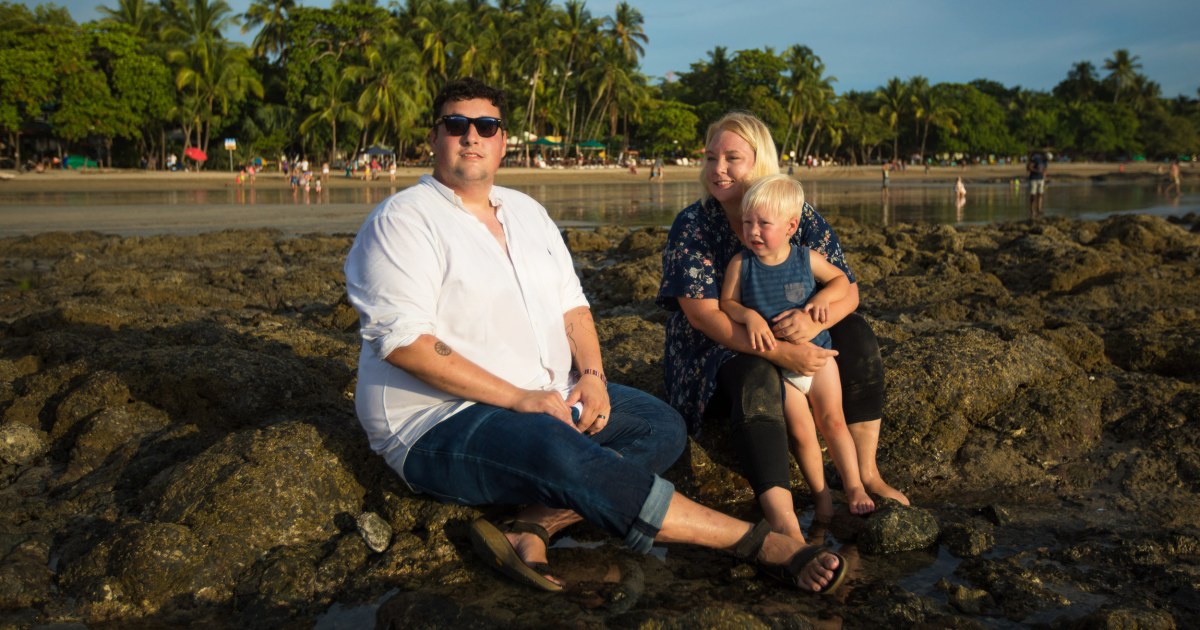
"All of this is possible because of the Airbnbs and Vrbos of the world," Jeromy said. "I don't think we could really pull it off without those services, because we're not in a situation where we could 'hostel it.'"
How long they will continue living out of a few suitcases ultimately comes down to their son. They are eyeing an end-date of late 2022 or early 2023, when he'll start preschool. In the meantime, they will be on the move, trying to see as much as they can in a few years and with a toddler in tow.
Work-life flexibility
Before the pandemic, the term "virtual nomad" applied to a privileged few who had found a way to finance perpetual travel — and seemed to do so effortlessly. But when Covid-19 forced employers to go remote, it opened up the possibility of a nomadic lifestyle to entirely new groups of people.
Now, despite employers setting dates for full, in-person returns, many who took advantage don't want to go back.
"People have experienced the power of work-life flexibility, enhancing the quality of their lives, their satisfaction," said Tsedal Neeley, a professor at Harvard Business School and author of the book "Remote Work Revolution: Succeeding From Anywhere."
Different from what Neeley calls the "forever unattainable" work-life balance, this newfound flexibility has allowed people to segment the day between work and life in a way that works best for them. In very practical terms, that means signing on for work, attending meetings and making deadlines but using off- or between-hours in a way that is more fulfilling — whether that means replacing morning commutes with a walk outside or sharing a meal with a spouse instead of eating alone at a desk.
"The digital nomad has the ultimate work-life flexibility," Neeley said. They can spend their off hours pursuing changes of scenery, warmer weather, winter sports, new cuisines or, simply, a place to decompress.
A boon for rental sites
Pandemic-era interest in digital nomadism, or working from anywhere, has been a boon for sites like Airbnb and Vrbo, which have seen growing demand for weeks- and monthslong stays. These kinds of lodgings offer flexibility for those on an open travel schedule, and they're often outfitted to function like a permanent residence, with workspaces, washing machines, cooking equipment and a range of creature comforts that allow people to travel lightly.
According to Airbnb, stays of four weeks or more almost doubled between 2019 and the first few months of 2021. Around 11 percent of long-term Airbnb bookers said they were living a nomadic lifestyle, based on a company survey.
Early in the pandemic, with the lockdown at its height, Airbnb users in the U.S. flocked to scenic, small-to-mid-size cities to enjoy the outdoors. The most popular destinations for two or more weeks included Park City, Utah; Durham, North Carolina; Santa Fe, New Mexico; Boise, Idaho; Richmond, Virginia; and Fort Walton Beach, Florida, among others.
Vrbo, which has crossover listings with other sites but its own following, also saw increases in demand for longer-term stays last year, reporting a 30 percent increase in bookings of at least three weeks compared to the same period in 2019. Its top destinations in 2020 included popular snowbird staples such as Phoenix, and Florida cities Fort Myers and Naples.
Now, as vaccination rates enable the lifting of travel bans, people are increasingly looking for destinations abroad. Searches for Airbnbs in popular locales like Iceland, Croatia and Greece have skyrocketed since talk of easing restrictions for vaccinated Americans began in the spring, according to company data. Countries that opened up first to Americans, like Mexico and Costa Rica, remain popular draws.
The great resignation
Despite nomadic life becoming more popular and more available to some, significant barriers still exist for most people because of the costs of traveling with kids or pets, the lack of options for people with specific accessibility needs, the many jobs that just aren't done on a computer or don't pay enough to allow for any kind of travel, among many other factors. More than 60 percent of Americans work in jobs that can't be done remotely, according to McKinsey research.
Also at play is the country's severe housing shortage, with a shortfall of 5.5 million units, according to the National Association of Realtors. That, coupled with the surge in demand for housing during lockdown, continues to drive up prices. With the median home price reaching an unprecedented $350,000, many buyers are quickly being priced out of the market.
But that doesn't necessarily mean the desire for a permanent residence is going away, and the competition for a dwindling number of places to live, including affordable apartments to rent, puts the focus on stability over transience.
"again" - Google News
July 06, 2021 at 05:15PM
https://ift.tt/36jGvuZ
As office life beckons again, the pandemic's digital nomads weigh benefits of a return - NBC News
"again" - Google News
https://ift.tt/2YsuQr6
https://ift.tt/2KUD1V2
Bagikan Berita Ini














0 Response to "As office life beckons again, the pandemic's digital nomads weigh benefits of a return - NBC News"
Post a Comment